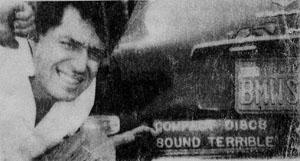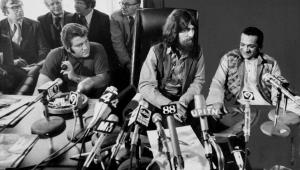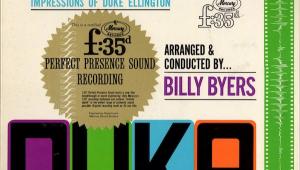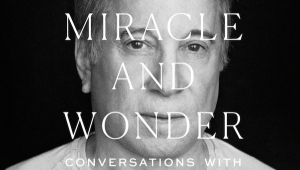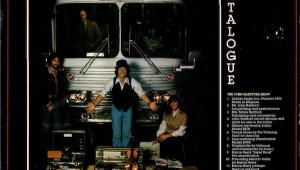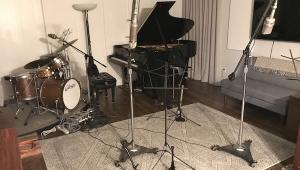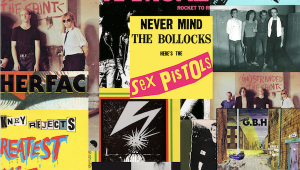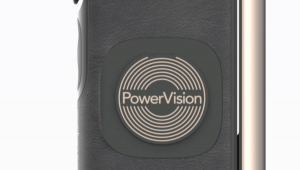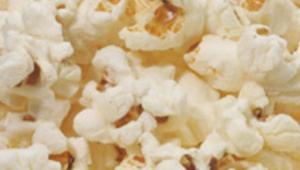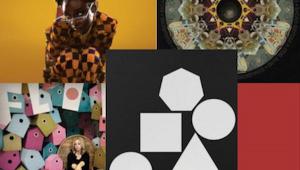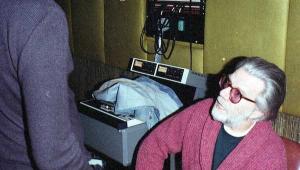Ten Years Into The Digital Revolution: A Continuing Disaster in Sound
Back in 1994, ten years into the "digital revolution," the editor of Tower Records's "Pulse" magazine, bravely commissioned me to write an article expressing my feelings about digital sound, ten years after the introduction of the compact disc. It was published in "Pulse!" much to my delight. I thought you might find it interesting in 2005--MF
" We've gained control, but we've lost the sound. The sound is gone". Its sensory depravation: you think you're hearing it but you're not. It's an insult to the brain and heart and feelings to have to listen to this and think it's music", so says Neil Young about digital recording. Young should know: he records all of his albums digitally.
"I'm keeping my records" says a well known CD reissue masterer whose work is praised by every gushy CD reviewer. "Its a disgrace", says a top Grammy Award winning digital engineer whose recordings have been heard and enjoyed by most Pulse readers. "The more I work with digital, the more I hate it" says another well known remastering engineer who works for one of the big labels. I can't mention his name: he wants to keep his job. "Digital sucks...a good analogue tape recorder will blow away any digital machine", said veteran engineer Eddie Kramer (Hendrix, Traffic etc.) in a recent Audio magazine interview. "I've yet to hear a CD cut from the same source sound as good as the vinyl cut from the same source" says Rhino's Bill Inglot.
"The Nirvana (Nevermind) vinyl LP blows away the CD! I cut it from the original analogue master tape so of course it sounds better", veteran Masterdisk engineer Howie Weinberg told me last year. And indeed when I played the LP for an MTV producer recently he almost keeled over. "It sounds like a different mix- much more reverberation around Kobain's voice. Much more punch altogether", he said in amazement.
In fact virtually all of the CD masterers with whom I've spoken over the past few years- industry veterans- names familiar to anyone who's ever read the back of a CD booklet- agree that an "old fashioned" all analogue vinyl LP played back on a good turntable through a good stereo system sounds much better- much more like the real thing than the finest CD made from an analogue or a digital master tape. These guys have no axes to grind- they're doing quite well in the "digital revolution".
Recently, an executive at a major label told me, off the record of course, that workers at the company have noticed that they are not "into" the music as much as they used to be- not tapping their toes as much. At first they chalked it up to the staff's advancing age, but finally they realized it was something about the "anonymous" sound of CDs. The emotional content of the music seems to have been stripped away. She was concerned, but as long as sales continue strong, it won't become an issue.
One thing is obvious: younger music lovers don't seem to be listening to music as intimately as an older generation did- lights out plunked between the speakers. Today music serves more as background to an activity- driving, sunbathing, sex. It always did that, but it used to count for more. Is that because of "lifestyle" changes? Is it the music itself? Or does the "wall of anonymous digital sound" as Neil Young characterizes it, contribute to a feeling of alienation from the music?
"Digitally remastered for better sound" is right up there in the truth department with "transferred to video tape for better picture". I've proven this over and over again even to the most committed CD diehards. Of course you need a good system to hear it. Then again if your only exposure to film is 8MM home movies, you might also believe the line about video tape.
Even proponents of digital recording like the excellent engineer George Massenburg (Little Feat, Linda Ronstadt) admit that the format at this point in its development has some serious sonic problems.
If you think digital is "perfect", if you think a CD sounds identical to a mastertape-analogue or digital, if you believe that bullshit on the back of an AAD CD that says "The music on this compact disc was originally recorded on analogue equipment. We have attempted to preserve as closely as possible the sound of the original recording. Because of its high resolution, however, the Compact Disc can reveal limitations of the source tape". If you believe that, there's some land in the Everglades I'd like to sell you. Or maybe you want to buy a Minidisc recorder/player?
In fact, analogue is a high resolution medium- despite its problems (every technology has problems- we've had 100 years to lick analogue's). Digital, sampled at 44.1K 16 bit words is low resolution. Minidisc is an even lower resolution medium- a compressed digital format that sounds the way it feels when you try to stand up from a window seat on an airplane- that's the best I can do to describe it succinctly. And when the ad says "Finally a CD you can record on", that's more advertising b.s. . Full 44.1K CD-R (recordable CD) has been around for years. Its just very expensive right now. Remember when CD players were $1000? Just wait. In the last few years CD-R machines have gone from about $8000 to $3000.
Even if records played on an expensive stereo system sound better than a CD, why should the average listener who is happy with CD sound, happy with all of the reissues and box sets, and happy to be rid of the admitted misery, inconvenience and expense of proper vinyl playback care about any of this? Why should you care about the disappointment of a handful of mostly wealthy (not me, I assure you), tweeky, audiophile nerds?
Here's why: Imagine if in the early sixties when primitive color videotape technology was introduced, the film industry immediately began archiving the entire history of the cinema onto videotape. Imagine if they then started chucking the original negatives, since the film had been "safely" stored on videotape. Imagine if they did so and said the videotape was a "perfect" copy of the film?
Imagine if the movie production companies then said "No more film, from now on we're going to shoot directly onto videotape. If you get a bad take you just roll it back and record over again, unlike film where once its exposed it has to be thrown away if the take is bad. This is the kind of control filmakers have always dreamed of! Now we have it. And look at the money we'll save!" And what if they then tried to charge you more for the "privilege" of watching a movie shot on video?
I'll tell you what would have happened: film makers, film archivists, critics- even the audience would have revolted. It would have been a scandal, a disgrace- the rape of an artform. Even today the colorization of black and white footage on videotape- a process that does no damage to the original film- is enough to bring about congressional hearings!
Then why, during the stone age of the "digital revolution" when the recording industry began archiving the entire history of recorded sound- a hundred year's worth- on a low resolution, primitive, seriously flawed version of what will someday actually be a great improvement in recorded sound, didn't music critics, music archivists, engineers and fans revolt against this travesty? (Keep this in mind: a number of digital engineers have told me [off the record of course] , that they'll play a DAT mastertape a week after it was recorded and it won't sound the same as when it was new. Others have told me that soon after making an archival digital mastertape "whole sections have had such severe dropout as to be totally useless").
Well some of them did. I know what the little boy who saw the naked emperor felt like. But unfortunately ignorance, greed, and in some cases outright corruption and extortion (talk and you'll lose your job) won out over the level headed truth. But then why should anyone be surprised? After all the "digital revolution" happened right smack dab in the middle of the "Reagan Revolution". Now I'm not blaming poor Ronnie for this particular mess, but it took place in the sordid, selfish, money at all costs atmosphere he fomented. And lots of money has been made during the first decade of this revolution.
Folks involved in every aspect of the music business rolled over for this digital "treat". Music critics who reviewed records on plastic turntables saying "hey man, I'm not into it for the technical side, I can enjoy music on a 3 inch speaker" became instant audio experts announcing the sonic superiority of the CD, once one of the genuinely awful first generation players was put in their hands.
Imagine a film critic reviewing a movie with the picture out of focus, the frame split, the screen almost dark and full of holes, and with the theater lights on, and not caring saying "hey man I'm not into movies for the technical side, I'm into it for the art". Wouldn't happen. And yet that's the visual equivalent of how most music critics reviewed records during the seventies. And they did it proudly! That first awful sounding CD player outperformed the plastic turntable and it had remote control!
Once the inventors of CD-Sony and Philips got the "perfect sound forever" digital hype going- and believe me they did a masterful job with a well oiled public relations organization called "The Compact Disc Group", there was no stopping it. Even the executives at the quality record labels (I wish I could name names) who at first resisted CD, hearing it for the sonic joke that it was, finally rolled over when they realized that consumers were willing to shell out $16.00 for teeth rattlingly bright, metallic sounding discs because the music was "read" by a laser beam.
When the promoters of this early sonic hell began getting complaints, they had the chutzpah to blame the awful sound on the analogue source material! "Its 'headbump' ", "its the rising high end of the microphones"- there was an excuse for every problem with early digital, except the real cause: early digital! Every technology has a learning curve, except of course digital sound, which was a gift from God, who is of course, digital.
The early DDD discs sounded even worse (still do). What digital maniacs who pronounced those "pure" digital discs "perfection" didn't know was that since there were no digital mixing boards in the early days, the digital recording had to be converted to analogue for mixing, before going back to digital, and then sometimes once more back to analogue before final mastering. Each digital to analogue conversion took its toll on the music, but don't tell that to the CD nerds who only bought DDD discs in the early days and complained (and still do!) about the sound of discs that had "A"s in them!
The vinyl LP didn't die, it was killed off (of course I exaggerate- LPs are still being pressed domestically and overseas: did you know that the latest releases from REM, U2, Guns and Roses, Nirvana, Bob Dylan, Michael Jackson, Branford Marsalis,Sonic Youth and others are available on domestic vinyl and that most everything in pop is available on imported vinyl?). Most of the chain "record" stores began reconfiguring their bins for CDs by the mid eighties, when CD player market saturation was only a few percent. They were committed to getting out of vinyl before the public was. Too big, too heavy, too fragile, too many defective pressings, too much trouble.
Even today only about a third of American homes have CD players. Turntables are still being manufactured and sold in healthy numbers, but the EIA, the Electronics Industries Of America- the lobbying group for the consumer electronics industry, refuses to collect or publish the numbers, though it will be happy to tell you how many toaster ovens and microwaves were sold in the United States last year. That's how desperate the big guys are to kill off analogue- break the link to a generation that has probably never heard it. News that 45s are making a comeback among "grunge" rockers is heartening.
Record companies plead "lack of demand" but did you know that by the late eighties most instituted a "no return" policy for vinyl even defective vinyl, thus making it extremely difficult for the small specialty stores that still wanted to carry records to do so? The big guys won't carry it, the little guys can't afford to. No wonder its hard to find vinyl!
The record companies have you, the consumer, and the retailers as well (their share of the $15.98 and now $16.98 list priced CDs is not all that great) by the short and curlies and they're not going to let go. Not when you eagerly shell out the big bucks for a product whose cost has now dropped to less than a couple of dollars a piece! I love watching the television commercials for greatest hits compilations: "12.98 for 2 cassettes or LPs (sometimes), $16.98 for one CD". Guess which has the highest profit margin?
As for the mainstream stereo magazines, who behaved like cheerleaders at the inception of the "digital revolution" they're nothing more than shills for the consumer electronics industry. I attended a dinner thrown for the audio press by one of the large electronics conglamorates and I sat aghast as the other "journalists" acted and spoke like cynical industry insiders instead of advocates for their readers. That's why they're excitedly splashing Minidisc and DCC all over their covers. Two new formats that go in exactly the wrong digital direction.
During the past decade while keeping up the "digital is perfection" facade, the industry has been working diligently behind the scenes to improve a technology that more and more thoughtful and honest individuals have come to see as seriously flawed. And it has gotten better. Due to their efforts and no thanks to those who declared digital "perfect " from the getgo, we are hearing better and better sounding discs. Unfortunately a large percentage of the great music of the past 100 years has already been "archived" using seriously deficient equipment. That's the greatest catastrophe of the "digital revolution".
The players and digital processors have also improved greatly over the past decade. If you own a first generation CD player, you ought to take some newer discs to an audio specialty store (a place that doesn't also sell microwaves and refrigerators) and hear how much better they can sound. It is reaching the point where a few CDs ( mostly made from analogue recordings) are approaching the sound of the best LPs. Unfortunately such performance doesn't come cheap. If you believe all CD players sound the same, there's that land in the Everglades.
The process by which analogue musical waveforms (music) are converted to numbers and then back to an analogue waveform is extremely complex. The format we are stuck with (44.1K sampling rate, 16 bit words) due to Sony and Philips' rush to get the product to the marketplace- music be damned- is, like our television standard, serviceable, but hardly the last word in resolution.
What we need to make digital truly better- more transparent and lifelike- is an improved format, one that samples the analogue waveform a few hundred thousand times a second instead of forty four thousand times a second, and one that uses more than 16 bits to describe each sample. Such technology is now becoming possible and at a reasonable price.
Unfortunately, what we are getting instead, are two formats, DCC and Minidisc, that do just the opposite! Both use less data,and claim only to come close to the performance of CD. In hyping these products the proponents will concentrate only on the analogue problems they solve, while ignoring the digital problems they create. And soon you'll be hearing about digital radio, another "perfect" format that offers less than CD resolution, but which neatly solves the static problems and the like of analogue radio. Clearly we are going in the wrong direction. The "digital revolution" is becoming the "digital devolution" as big companies work harder and harder to give you less so they can make more by selling you something new.
In another ten years or so, when CD player market penetration reaches the saturation point, the recording industry will be looking to give you a new music carrier. Whether its a better sounding, higher resolution digital format- or a lower resolution, worse sounding one that packs more music in a smaller package will depend in part on how you vote with your dollars on DCC and Minidisc. I hope you get it right this time, but even if you don't- I've got 10,000 records so I really don't care that much what you do. Oh, I've got lots of CDs too. Guess where I play them? Only in the car of course. Even though they're getting better, I still can't actually sit down and listen to those antiseptic sounding things when I've got so much vinyl staring me in the face.
Disclaimer:
Michael Fremer wants you to know that he appreciates all of the good things about CDs- their convenience (like frozen food), the lack of noise, the perfect pitch, the relatively high performance you can get out of a cheap player and the like, and that he's happy about the availability of so much great old music on CD at a reasonable price, but he was asked by the editor to write about the down side of digital. He also regrets biting the hands that feed him CDs (the record companies), but only a little.
